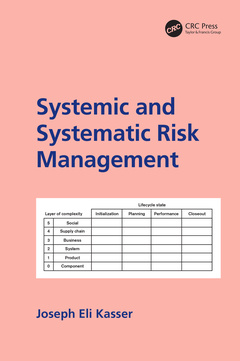Description
Systemic and Systematic Risk Management
Author: Kasser Joseph E.
Language: English
Subjects for Systemic and Systematic Risk Management:
Keywords
Edwards III; Compliance Matrix; Undesirable Situation; Ill Structured Problems; Project Lifecycle; System Requirements State; Policy Lifecycle; Change Management; Generic Project Risks; Risk Mitigation; Risk Framework; Strategic Management; Active Brainstorming; Systems Thinking; Systems Engineering; System Lifecycle; LEP; SLC; Policy Implementation Plan; firm fixed price contract; Context Diagram; project management; Software Project Risks; systemic and systematic risk management; Single Correct Solution; policy creation; Subjective Complexity; Solution System; Risk Management Process; Poor Requirements; Follow; Risk Management; Problem Solving Process; Restraining Forces; Root Definitions
Publication date: 02-2022
· 15.6x23.4 cm · Paperback
Publication date: 06-2020
· 15.6x23.4 cm · Hardback
Description
/li>Contents
/li>Readership
/li>Biography
/li>
This book discusses risk management as it applies to problem-solving for simple, complex and wicked problems faced by policy creators and implementors, project managers and systems engineers in the context of policies, large engineering projects (LEPs), projects and systems. When applying systems thinking to risk management, it can be seen that risk management applies to almost every action taken in daily life. This book:
- Introduces the systems approach of integrating risk management into policy creation and implementation, project management and systems engineering, such as the risk framework and the Firm Fixed Price (FFP) contract with penalties and bonuses.
- Introduces a number of out-of-the box concepts building on the application of the systems thinking tools in the system thinker?s toolbox.
- Points out that integrating risk management into policy and project management and systems engineering is just good management and engineering practice.
- Discusses the flow of risk in a policy from creation through implementation via LEPs and simpler projects, identifying where risks arise and where they should be dealt with.
- Presents the risks in the relationship between policy creation, implementation, project management and systems engineering.
- Discusses risks throughout the policy implementation process and shows how the nature of risks changes from political to financial to technological as implementation proceeds.
- Discusses managing complexity and specifies the minimum number of elements in a system for it to be defined as, and managed as, complex.
- Points out that in most instances the traditionally ignored major implementation risk is that of poor performance by personnel.
- Shows how to proactively incorporate prevention into planning in order to prevent risks, as well as how to mitigate them when they occur.
1. Introduction 2. Thinking 3. Risks and Risk Management 4. Change 5. Problems and Problem-Solving 6. Systems and Systems Engineering 7. Basic Project Management 8. An Introduction to Managing Risk in LEPs 9. Perspectives of Polices 10. Afterword
Joseph Kasser has been a practicing systems engineer for almost 50 years, a project manager for more than 35 years and an academic for 20 years. He is a Fellow of the Institution of Engineering and Technology (IET), a Fellow of the Institution of Engineers (Singapore), the author of ‘Systems Engineering a Systemic and Systematic Methodology for Solving Complex Problems’, ‘Systemic and Systematic Project Management’, ‘The Systems Thinkers Toolbox: Tools for Managing Complexity’, ‘Perceptions of Systems Engineering’, ‘Holistic Thinking: Creating Innovative Solutions to Complex Problems’, ‘A Framework for Understanding Systems Engineering’ and ‘Applying Total Quality Management to Systems Engineering’, two books on amateur radio and many International Council on Systems Engineering (INCOSE) symposia and other conference and journal papers.
He received the National Aeronautics and Space Administration’s (NASA) Manned Space Flight Awareness Award (Silver Snoopy) for quality and technical excellence for performing and directing systems engineering. He holds a Doctor of Science in Engineering Management from The George Washington University. He is a Certified Manager, a Chartered Engineer in both the UK and Singapore and holds a Certified Membership of the Association for Learning Technology. He has been a project manager in Israel and Australia, and performed and directed systems engineering in the USA, Israel and Australia. He gave up his positions as a Deputy Director and DSTO Associate Research Professor at the Systems Engineering and Evaluation Centre at the University of South Australia in early 2007 to move to the UK to develop the world’s first immersion course in systems engineering as a Leverhulme Visiting Professor at Cranfield University. He spent 2008-2016 as a Visiting Associate Professor at the National University of Singapore where he taught and researched the




